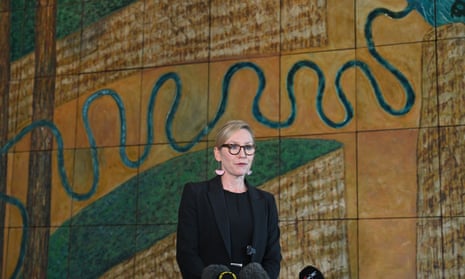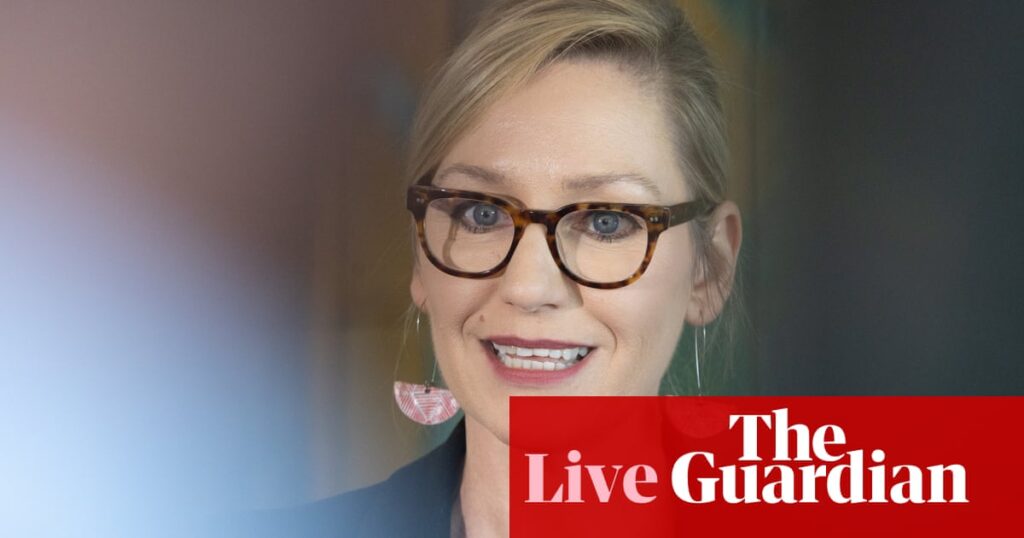Greens announce free contraceptives policy for women

Natasha May
The Greens have announced a new election policy to provide women with free access to contraceptives.
The policy would mean women would not have to pay out of pocket for oral contraceptives, including more modern pills with fewer side effects, as well as long-acting reversible contraceptives including intrauterine devices (IUDs).
Under the policy, the Greens would allocate an ongoing and indexed $250m a year to make medicines regulator approved non-PBS contraceptives free, as well as removing the PBS co-payment to make PBS listed contraceptive methods free.
It would also create a contraceptive counselling medicare benefits item.
The party’s spokesperson on women, Larissa Waters, says the policy would help “empower women to make decisions about bodily autonomy despite a difficult financial climate”:
Our policy would make sure people can access the contraception that works for them, regardless of their bank balance and whether they live in the city, the country, or are studying on a visa.
With abortion rights in Queensland potentially under threat it has never been more important to ensure women are able to avoid unwanted pregnancies.

Key events
More than half of all Australia National University poll respondents lack confidence in Labor
As mentioned at the top, a new poll out today has some concerning findings for the Labor government.
The study by the Australian National University found that 17.4% of respondents said they had no confidence at all in the federal government; 44.8% had “not very much confidence”; 32.8% “quite a lot” and just 5% “a great deal of confidence”.
However, there were some more encouraging pointers for Labor, with more favouring Anthony Albanese as prime minister over Peter Dutton.
Here’s the full report:
MP Stephen Jones urges Australians to check travel advice to South Korea “given things are moving so rapidly” after the country’s president declared, and then rescinded, martial law overnight.
He said on ABC Radio National this morning:
[It’s a] very fluid situation over there at the moment.
We’re urging Australians to just check in with the travel advice.
Clearly, we’ve got concerns about what’s going on over there. Our number one concern is for the safety of Australians who are contemplating a trip over there. Just watch the travel advice is the best advice I can give at this moment, given things are moving so rapidly.
There have been no updates to the government’s Smartraveller advice for South Korea since 9 July 2024, which advises to “exercise normal safety precautions in South Korea”.
Transport costs still taking 16% of household income over last quarter
More on transport costs:
The falling price of fuel had a significant impact, the Transport Affordability Index found, reducing transport costs by an average of $338 across all households.
But cuts to public transport fares made the biggest impact, forcing down transport prices in Queensland, the ACT and the Northern Territory.
Only Queensland’s public transport price cuts were designed to be permanent, however, with fares in other states free on a temporary basis.
Despite 50-cent fares up north, Hobart claimed the title of lowest annual transport costs, followed by Darwin, while Sydney, Melbourne and Perth registered the highest costs.
Transport costs also fell across seven regional areas surveyed for the index, with transport in Alice Springs, Bunbury and Geelong costing the most at over $23,000 a year, while Townsville and Wagga Wagga registered the cheapest bills at just over $20,000 a year.
Even though costs fell in most cities and towns, the Australian Automobile Association’s managing director, Michael Bradley, said transport consumed 16.1% of household income during the quarter and remained a major drain on family budgets.
“Transport costs are significantly higher than they were before the (Covid) pandemic,” he said.
“The typical Australian household’s transport costs have risen from 13.9% of its income in September 2019 to 16.1% in September 2024.”
– Australian Associated Press
Deals on the bus go down and down: transport costs plunge
The cost of getting around has fallen for the first time in two years, a study has shown, but households in some states are faring better than others thanks to public transport discounts.
The Australian Automobile Association detailed the extent of the savings in its Transport Affordability Index today, revealing travel costs fell by an average of $921 a year for those living in capital cities.
But Brisbanites were significantly better off than people in other states, saving $3316 a year on average, thanks to the introduction of 50-cent fares for public transport.
On the other side of the ledger, Sydneysiders fared the worst, with transport costs rising in the city by $107 a year due to high toll prices.
The report, prepared quarterly by the motoring body, analysed household transport costs including registration, servicing, insurance, car loans, fuel and public transport to determine spending.
– Australian Associated Press
More to come in the next post.
Full Story on Labor’s end-of-year legislation rush
Parliament has wrapped for 2024 and politicians are now back in their electorates for the summer. Labor ended the year on a high, striking deals to pass more than 30 pieces of legislation through the Senate in just one day.
And while the sitting year is over, speculation is still running hot over when the prime minister will call the federal election.
In today’s Full Story podcast, Nour Haydar speaks to chief political correspondent Paul Karp about what the government achieved – and compromised – in the final frenetic sitting day, and what Anthony Albanese could now be weighing up as he decides when voters will head to the polls.
Greens announce free contraceptives policy for women

Natasha May
The Greens have announced a new election policy to provide women with free access to contraceptives.
The policy would mean women would not have to pay out of pocket for oral contraceptives, including more modern pills with fewer side effects, as well as long-acting reversible contraceptives including intrauterine devices (IUDs).
Under the policy, the Greens would allocate an ongoing and indexed $250m a year to make medicines regulator approved non-PBS contraceptives free, as well as removing the PBS co-payment to make PBS listed contraceptive methods free.
It would also create a contraceptive counselling medicare benefits item.
The party’s spokesperson on women, Larissa Waters, says the policy would help “empower women to make decisions about bodily autonomy despite a difficult financial climate”:
Our policy would make sure people can access the contraception that works for them, regardless of their bank balance and whether they live in the city, the country, or are studying on a visa.
With abortion rights in Queensland potentially under threat it has never been more important to ensure women are able to avoid unwanted pregnancies.
More on the new Malaysia-based maritime institute:
The government is contributing $1.78m over four years to support the institute, which will train regional government officials on the United Nations Convention on the Law of the Sea, broader maritime law and ocean governance, awareness of maritime domains and environmental protection.
Wong’s Malaysia visit is part of a short regional tour that also took in Singapore, where she joins the defence minister, Richard Marles, and trade minister, Don Farrell, for annual talks with their Singaporean counterparts.
Speaking from Singapore yesterday, Marles acknowledged tensions elsewhere in the region around the Taiwan straits and downplayed the decision of Taiwan’s president, Lai Ching-Te, to tour US Pacific territories in a move some criticised as needlessly provocative towards China. He told ABC TV:
We don’t want to see any unilateral changes to the status quo across the Taiwan straits, and our focus is on doing everything we can in terms of exercising our international voice around promoting stability and peace in and around the Taiwan straits, in and around Taiwan.
Australia launches new maritime security educational institute in Malaysia
Australia is funding a new Malaysia-based maritime institute to teach officials from around the Indo-Pacific about the international laws of the sea and encourage stability, especially in the South China Sea, where competing territorial claims have seen clashes between China and its neighbours.
The foreign minister, Penny Wong, will today launch the Australian National Centre for Ocean Resources and Security (Ancors) South-east Asia Maritime Institute, to be based on the University of Wollongong’s remote campus in Kuala Lumpur.
Rules and norms are vital for our shared maritime region and the countries of our region make an ongoing contribution to maintaining and promoting them.
The institute will deliver training to officials from across the region on complex maritime legal and policy topics. It will nurture leaders and help further our collective contribution to a peaceful, stable and prosperous Indo-Pacific region.
More to come in the next post.

Cait Kelly
Anglicare’s executive director, Kasy Chambers, said Australia’s employment system needs to be overhauled to put support ahead of punishment:
Australians have heard a lot of rhetoric over the years about full employment and a fair go. But our snapshot shows that the employment system has given up on people who need the most help to find work.
These can be people with disabilities, people who didn’t finish year 12, or older workers who lost their jobs later in life.
They need entry-level jobs to get a start, but there aren’t enough of these to meet demand in any part of the country. For each entry-level role, there are 33 people looking for work.
With such tight numbers, people with barriers to work barely stand a chance. It’s no wonder that many are long-term unemployed. Each year, we find that the same people are being left behind by the job market

Cait Kelly
Same people locked out of job market every year: Anglicare Australia
Anglicare Australia is today releasing its annual jobs availability snapshot, which shows that the job market has been locking the same people out of work every year.
The snapshot measures how many jobs are available for people who don’t have qualifications or work experience. It found:
-
For every entry-level job, there are 33 people out of work.
-
The situation is worst in the NT, where there are 65 people for every job, followed by Tasmania where there are 50.
-
Around two-thirds (62%) of people out of work are long-term unemployed.
-
These Australians spend almost four years looking for work.

Rafqa Touma
Thank you to Martin Farrer for kicking off the blog this morning. I’ll be taking it for the day – if there is anything you don’t want the blog to miss, send it my way on X @At_Raf_
More on that Cbus report from AAP:
Paddy Crumlin, the former CFMEU ACT president Jason O’Mara, and the CFMEU’s legal director, Lucy Weber, were reassessed against both the fund’s former “fit and proper person” test and a more stringent one recommended by the review authors, Deloitte. All passed, as did sitting board members.
“Cbus will now work with Deloitte, as required by the licence conditions, to develop an action plan to address each of the recommendations in the review to be approved by APRA,” Cbus said in a statement, referring to the financial regulator.
The fund in recent years has swallowed smaller industry funds for media, energy and electrical workers, increasing its membership by 10% to 900,000 members.
It is the seventh-largest industry super fund by total funds under management and the 10th-largest overall.
The CFMEU’s construction arm was placed into administration in August after allegations of criminal conduct and organised crime links on job sites.
The Fair Work Ombudsman is conducting more than 40 investigations into the building and construction industry involving most CFMEU branches across Australia, as well as its officials and employers.
Review questions Cbus partnerships with CFMEU
A super fund heavyweight’s partnerships with the embattled construction union CFMEU may not have been in the best interests of its 900,000 members, a review has concluded, according to the Australian Associated Press.
Cbus, which is chaired by former treasurer Wayne Swan, released an independent review of its governance and board members yesterday, instigated amid heavy scrutiny of the CFMEU’s construction arm.
The fund accepted all 26 recommendations, including overhauling how it decides and documents extensive payments to the union.
Nearly $1m in payments were made to the union’s various branches in the past financial year, including for rental of premises in Geelong and Perth and cross promotions. But the review found evaluation of the partnership was dominated by informal processes, including spoken feedback. It says:
This is not to question intent or whether ultimately decisions are in the best financial interests of members or not. It’s just that the documentation, systems and processes do not allow for that decision to be concluded clearly.
But it cleared the appointments of union-linked board members, including the CFMEU national president, Paddy Crumlin.

Elias Visontay
Sydney the only city paying higher transport costs over last quarter
Transport costs have eased for all Australians – except for Sydneysiders – as falling fuel prices and cheaper public transport fares combined with rising wages.
Typical Australian household spending on transport declined by 2.6% in the September quarter, the largest decrease in transport inflation since 2017, despite the broader measure of inflation across society (the consumer price index) climbing by 0.2% in the quarter.
Analysis of transport affordability, produced by the Australian Automobile Association (AAA), found that the consumer relief was driven by an average $338 reduction in a typical household’s fuel bill, coupled with cuts to public transport ticket costs.
This includes temporary free transport offers in Canberra and Darwin, as well as Queensland blanket 50c fares which were introduced in August but have since become permanent.
However Sydney bucked the trend as the only location in the country where household spending on transport rose. This was because higher toll road charges, which have annual increases baked in, offset the benefits of cheaper fuel.
Brisbane’s annualised typical household transport costs dropped by $3,316, or 12.5%; Canberra’s by $1,799, or 7.2%; and Darwin’s by $1,416, or 6%. Across the five other state capitals, the average change in transport costs was only 0.7%.
AAA’s managing director, Michael Bradley, said transport costs were still significantly higher than before the pandemic, with a typical household’s costs rising from 13.9% of its income in September 2019 to 16.1% in September 2024. Bradley said:
Transport is a significant and unavoidable expense, and rising transport expenditure is also one of the key drivers of inflation. Governments at all levels must consider these cost pressures when formulating policy.
Easey Street suspect returns
Almost five decades on from the “gruesome” and “brutal” alleged murder of two women in their home, a suspect in the investigation into the frenzied stabbings has touched down in Australia, Australian Associated Press reports.
Perry Kouroumblis landed in Melbourne late on Tuesday night after being extradited from Italy, marking the first time in about eight years he has stepped foot on Australian soil.
Police were set to interview Kouroumblis on Wednesday and he was expected to face Melbourne magistrates court later in the day.
Victoria police said in a statement that he will formally be charged with two counts of murder and one count of rape during this court appearance.
He maintains his innocence.
He was arrested at Rome’s Leonardo Da Vinci airport in September in connection to the alleged killing of Suzanne Armstrong, 28, and Susan Bartlett, 27, in January 1977.
Dubbed the “Easey Street murders”, the friends were found dead with more than two dozen stab wounds in their home on Easey Street in Collingwood in Melbourne’s inner north.
Welcome
Good morning and welcome to our live news blog. I’m Martin Farrer with the top overnight stories after which Rafqa Touma will be your host.
Cbus, the super fund heavyweight chaired by former treasurer Wayne Swan, has released an independent review of its governance and board members which concludes that partnerships with the CFMEU’s construction arm may not have been in the best interests of its members. More details coming up.
A day after our Essential poll revealed voters thought the government had done poorly on the key issues of housing affordability and wages, a new survey shows support for federal Labor is at Scott Morrison-type low levels, with no more than six months before the next election. We have the details, plus today’s Full Story podcast looking at the state of play in Canberra.
The man wanted for questioning by police over the Easey Street murders in 1977 has landed in Melbourne overnight. Perry Kouroumblis, 65, a Greek Australian, has been extradited from Italy to face questioning by police today over the alleged killings of Suzanne Armstrong and Susan Bartlett in Melbourne. He maintains his innocence. More coming up.
And there’s good news for commuters – transport costs have seen their biggest fall in years. Everywhere except for one city, that is. More on that soon.



